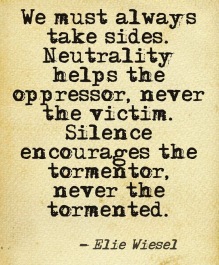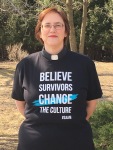Hello from Arizona my friends.
I’m down here for some writing time working on the 2019 Break The Silence Sunday materials, and taking a little break from the cold of a Wisconsin winter.
An Update On The General Synod Resolution
When last I wrote we were just beginning to gather support, needing a minimum of six United Church of Christ congregations to sign on in support of the resolution before it could be submitted to the national church. I wasn’t sure we were going to find six churches who would be willing to consider the resolution, or who would be able to meet and vote on it in the short time frame we were working with (and during Advent as well). But you all AMAZED me. When the resolution was submitted we had 20 congregations as well as two conferences of the U.C.C. supporting us. TWENTY!!!!! The congregations are from across the country, small and large, urban and rural, and at all kinds of different places in their work of supporting survivors, but all twenty took a leap, reached down in their hearts and deep into the Gospel and found it within themselves to speak out in support of survivors, and I am in awe. A huge thank you to Maren Tirabassi for her tirelessness in working to find congregations to support the resolution in the eastern part of the country.
I’ll list the congregations and conferences at the end of this post. Additional congregations, individual clergy, organizations (seminaries & U.C.C. groups), and conferences are still welcome to sign on in support. You won’t be listed as officially submitting congregations because that had to happen by January 1, but rest assured your supporting voice will still be heard!
The next step is that the resolution goes to the U.C.C.’s Board of Director’s Committee on Disposition (doesn’t that sound imposing and slightly scary?). That committee determines if the resolution meets all of the requirements of the by-laws and standing rules of the General Synod. Assuming that they approve the resolution it will then be officially circulated to delegates, and on the Synod website. Once at Synod it will be assigned to a working committee who will study it, suggest and make changes (every resolution ever submitted has been changed in some way so I’m trying not to worry about this overly much), and then eventually it will make its way to the floor of the Synod for a vote. After that, assuming the floor vote is affirmative, it goes to the national church for implementation and all U.C.C. churches are invited to participate in BTSS.
You can see a PDF of the final, fancy version of the resolution with line numbers and everything here: btss general synod resolution final submitted version. Many, many thanks to David Anderson from the national church who guided me through the submission process to make sure the resolution meets requirements.
General Synod Advocacy Budget
Now that the resolution has been submitted, it’s time to think about being present at Synod to listen to survivors who need to share their stories, to advocate for the resolution, to talk with people who have questions, and to simply be visible and present. This is, as you might imagine, not going to be inexpensive. Synod is a five day event, blessedly this year in Milwaukee so I can drive from home, but there is registration, and housing, and meals, and then a host of advocacy and visibility materials that will make our presence more effective. My survivor sister friend Lella has agreed to go with me, to be my valet as it were, and make sure that I remember to drink some water, and breathe regularly during this whole process.
Budgets and money are not really my strength, but I’ve worked up some numbers that cover everything from registration fees, to housing, to cards to send to folks who support us, to buttons, to t-shirts so Lella and I can be seen wherever we go (and maybe so we can find each other across the sea of people at Synod).
Break The Silence Sunday needs your help – $5 or $50 or $500 would be wonderful. We have a PayPal account just for this with our email address (breakthesilencesunday@gmail.com) and I would be grateful for whatever you can contribute. And my friends, I know some of you are in difficult financial situations. PLEASE do not put yourself in a harder space by thinking you have to contribute. If you can’t, I completely understand. In that case, send me a note and tell me you’re thinking of us, of Lella and I as we embark on this huge unknown scary thing), and look to the blog here in future days for lots of other ways you can help out. ♥♥♥
2019 B.T.S.S. Advocacy At General Synod Budget
Synod Registration $500
Hotel $900
Parking $75
Transportation $20
Meals $430
Website hosting $100
Business cards $55
Correspondence (cards, labels, postage) $120
General office supplies (paper, ink, pens, etc.) $100
T-shirts $300
Buttons & stickers $255.50
Miscellaneous $75
Total Budget $2930.50
Some folks have already contributed. We have raised $885 as of this writing, meaning that we have $2045.50 yet to go.
Want that PayPal address again? breakthesilencesunday@gmail.com
And if you want to see the full detailed budget look here: synod advocacy budget
Resolution Heroes
Finally, and most importantly, here is the list of sponsoring congregations and conferences for our resolution:
St. John’s U.C.C. Cecil, Wisconsin
Trinity U.C.C. Shiocton, Wisconsin
St. John’s U.C.C. Black Creek, Wisconsin
Orchard Hill U.C.C. Chillicote, Ohio
Valley City Congregational U.C.C. Valley City, North Dakota
Westmoreland Congregational U.C.C. Bethesda, Maryland
Second Christian Congregational U.C.C. of Kittery, Maine
Bethesda U.C.C. of Bethesda, Maryland
First Congregational U.C.C. of Rochester, New Hampshire
Alfred Parish Church U.C.C. Alfred, Maine
Trinity U.C.C. Manchester, Maryland
Claremont U.C.C. Claremont, California
Epiphany U.C.C. St. Louis, Missouri
Berkeley Chinese Community Church U.C.C. Berkeley, California
First Congregational U.C.C. Grand Junction, Colorado
Immanuel U.C.C. West Bend, Wisconsin
Chinese Congregational Church U.C.C. San Francisco, California
Pilgrim U.C.C. Grafton, Wisconsin
Peace U.C.C. Webster Groves, Missouri
Wisconsin Conference U.C.C.
Penn Northeast Conference U.C.C.
 The second year of Break The Silence Sunday (BTSS) has now been observed in several congregations, though I’ve learned that others will be remembering it in the next couple of weeks because of their parish schedule. I find myself, as I did last year, a bit spent after the work (physical, emotional, spiritual, liturgical) of preparing the materials, distributing them, and then leading the service in our parish. It surely didn’t help this year that BTSS was just a week after work of Holy Week, and Easter.
The second year of Break The Silence Sunday (BTSS) has now been observed in several congregations, though I’ve learned that others will be remembering it in the next couple of weeks because of their parish schedule. I find myself, as I did last year, a bit spent after the work (physical, emotional, spiritual, liturgical) of preparing the materials, distributing them, and then leading the service in our parish. It surely didn’t help this year that BTSS was just a week after work of Holy Week, and Easter.
 (5) Speak up. Use your voice. If someone makes a rape joke in front of you, stop them and ask them to explain why it’s funny. If they use derogative words to describe so
(5) Speak up. Use your voice. If someone makes a rape joke in front of you, stop them and ask them to explain why it’s funny. If they use derogative words to describe so









